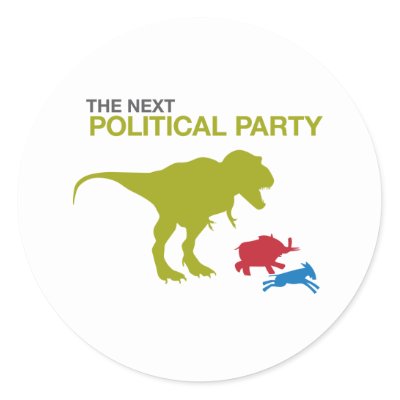 The notion that a third political party could emerge in American politics — occupying some kind of radical center that combines the “best” positions of both parties while dispensing with their posturing and gamesmanship — is the chimera of modern political conjecture. Looking for this party’s arrival on the horizon is like squinting into the woods to glimpse Bigfoot. Waiting for it to come galloping in to save our faith in government is to wait for Godot.
The notion that a third political party could emerge in American politics — occupying some kind of radical center that combines the “best” positions of both parties while dispensing with their posturing and gamesmanship — is the chimera of modern political conjecture. Looking for this party’s arrival on the horizon is like squinting into the woods to glimpse Bigfoot. Waiting for it to come galloping in to save our faith in government is to wait for Godot.
The public would benefit from more political options, certainly. But turning to a third political party is too narrow, too unimaginative, and too unrealistic a solution. First of all, it wouldn’t fit on the current political spectrum. While study after predictable study claims to have confirmed that the two major parties are more polarized than ever, there is by no means a gaping space between them that could accommodate an entirely new party and its range of positions on every issue. It’s a matter of logistics — there just isn’t room.
But frankly, the larger issue is that three options is only marginally better than two. Calling for a third political party is just thinking way too small.
The fanciful third party panacea overlooks the actual problem with the “political spectrum” as currently conceived, which is that it is a fraud. The conventional thinking is that there is one spectrum, with people falling in different places along it based on their politics. I’d argue that instead — and this is by no means a new idea — there is a spectrum for every issue, with people falling on one side or the other of center based on their own principles and convictions. While you can average those positions and locate people on a broader “political spectrum,” that doesn’t change the fact that most will fall left-of-center on some matters and right-of-center on others.
Political parties do not respect this reality. Instead, they put immense pressure on policymakers to stick to the same side of center on every issue, principles be damned. And to a large degree our policymakers have acquiesced. How else could we end up with one party that unilaterally opposes the Violence Against Women Act, and another that refuses to even discuss changes to a Social Security system that is unarguably headed for trouble?
It’s this sort of manufactured hyperpartisanship that looks so absurd to the American people, and which has delivered a congressional approval rating in the single digits. Enter the Third Party Prognosticators! The people think less of Congress than they do of porn, polygamy, and the BP oil spill! What better time for a new party than now? they breathlessly ask.
We don’t need a new party. What we need is a new way of thinking about politics — one that accounts for the ability of every person to be conservative on some issues and progressive on others. We don’t need three national parties to encapsulate the 535 members of Congress; we need 535 individuals capable of discussing, understanding, and voting on the issues based on a combination of personal principle and their view of what is best for their constituents and the nation. Each should be a political party unto his or herself.
This will seem naive to my friends who work in the political party infrastructures, and it undoubtedly is. It’s awfully difficult to get elected to national office without the financial support of one party organization or the other. And if such a person did win, it’s hard to say how effective they could be without swearing fealty to the Ds or the Rs; as far as I know, no one in recent history has tried to do it. Angus King is currently testing this theory by running for Senate from Maine as an Independent, and refusing to promise to caucus with either party. He’s favored to win, so we’ll likely see just how naive a notion this is soon enough.
Should he win — and should he maintain his independence once in office — it’s possible voters in other states may get the idea in their heads that they’d like a similarly unencumbered leader representing them. What if King started a PAC that raised money for independent candidates (small i) who vowed not to sign on with either party? What if that led to a small but influential cadre of unattached legislators in each house of Congress who were consistently the key votes on major bills? And what if, seeing the impact of this new approach, the American people saw to it that this PAC is wildly successful at raising money?
It’s a lot of what ifs, I know. But looking at the system we have now is like looking at a dilapidated old house on a beautiful piece of land: it’s hard not to let your mind imagine what could be.